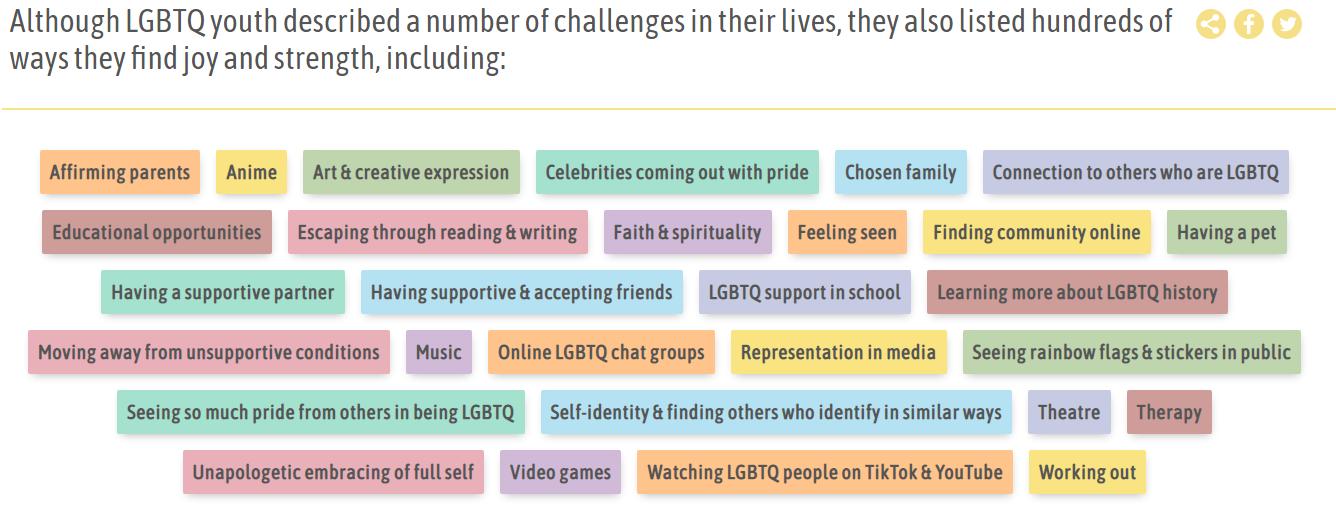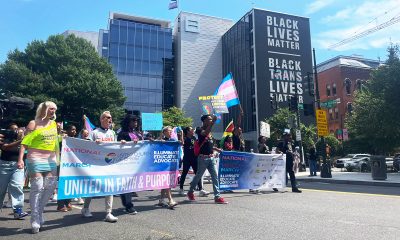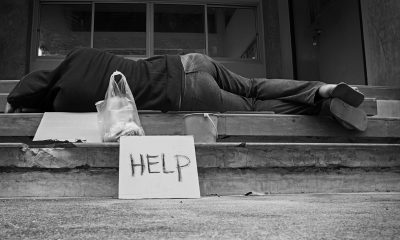National
80% of LGBTQ Youth reported the pandemic badly stressed them out
The past year has been really difficult for so many of us, but we also know that LGBTQ youth in particular are facing unique challenges

WEST HOLLYWOOD – In its third annual survey released late last week, The Trevor Project found that well over two-thirds of the 35,000 LGBTQ youth ages 13–24 across the United States interviewed reported that the affects of the coronavirus pandemic has largely negatively impacted their lives.
“The past year has been incredibly difficult for so many LGBTQ young people because of multiple crises, from the COVID-19 pandemic to the hostile political climate and repeated acts of racist and transphobic violence. This data makes clear that LGBTQ youth face unique mental health challenges and continue to experience disparities in access to affirming care, family rejection, and discrimination., ” Amit Paley, CEO & Executive Director of The Trevor Project told the Blade in an emailed statement.
“We are proud that this survey sample is our most diverse yet, with 45% being LGBTQ youth of color and 38% being transgender or nonbinary. The data speaks to the wide variety of experiences and identities held by LGBTQ youth across the country, and emphasizes the need for comprehensive, intersectional policy solutions to confront systemic barriers and end suicide,” he added.
The Trevor Project also noted that this year’s survey reflected a wider sense of diversity, with 45% of LGBTQ youth survey being of color and 38% being transgender or nonbinary. The study highlights that only 1 in 3 LGBTQ+ youths live in an affirming home. It also shows the impact of discrimination on the mental health of LGBTQ+ youths of color.
According to the report, 42% of LGBTQ youth seriously considered attempting suicide in the past year, including more than half of transgender and nonbinary youth. Additionally, 12% of white youth attempted suicide compared to 31% of Native/Indigenous youth, 21% of Black youth, 21% of multiracial youth, 18% of Latinx youth, and 12% of Asian/Pacific Islander youth.
Statistically, LGBTQ+ youth are more at risk for depression and suicide than their heterosexual peers. A contributing factor is the lack of an affirming home space or environment. More than 80% of LGBTQ youth stated that COVID-19 made their living situation more stressful — and only 1 in 3 LGBTQ youth found their home to be LGBTQ-affirming.
“These findings are extremely concerning as they highlight many distinct factors that contribute to LGBTQ youth suicide risk. But we encourage lawmakers, public health officials, and youth-serving organizations to focus on the protective factors illuminated in the data, which point to best practices on how to better support LGBTQ young people,” Dr. Amy Green, Vice President of Research at The Trevor Project the licensed clinical psychologist who oversaw the survey said.
“Once again, we find that LGBTQ-affirming spaces and transgender-inclusive policies and practices are consistently associated with lower rates of attempting suicide. The past year has been really difficult for so many of us, but we also know that LGBTQ youth in particular are facing unique challenges,” said Green.
Key Findings include:
94% of LGBTQ youth reported that recent politics negatively impacted their mental health.
70% of LGBTQ youth stated that their mental health was “poor” most of the time or always during COVID-19.
48% of LGBTQ youth reported they wanted counseling from a mental health professional but were unable to receive it in the past year.
30% of LGBTQ youth experienced food insecurity in the past month, including half of all Native/Indigenous LGBTQ youth.
75% of LGBTQ youth reported that they had experienced discrimination based on their sexual orientation or gender identity at least once in their lifetime.
Half of all LGBTQ youth of color reported discrimination based on their race/ethnicity in the past year, including 67% of Black LGBTQ youth and 60% of Asian/Pacific Islander LGBTQ youth.
13% of LGBTQ youth reported being subjected to conversion therapy, with 83% reporting it occurred when they were under age 18.
Transgender and nonbinary youth who reported having pronouns respected by all of the people they lived with attempted suicide at half the rate of those who did not have their pronouns respected by anyone with whom they lived. Trans and nonbinary youth who were able to change their name and/or gender marker on legal documents, such as driver’s licenses and birth certificates, reported lower rates of attempting suicide.
LGBTQ youth who had access to spaces that affirmed their sexual orientation and gender identity reported lower rates of attempting suicide. An overwhelming majority of LGBTQ youth said that social media has both positive (96%) and negative (88%)impacts on their mental health and well-being.
“The Trevor Project is the largest suicide prevention organization for LGBTQ youth, but even we do not know how many LGBTQ youth die by suicide each year because that data is simply not collected systematically,” Green said and added; “This third annual survey aims to fill the gaps in the limited research we do have on LGBTQ youth mental health and suicide risk as a means to raise public awareness and improve public health interventions.”
To read the full report go here: https://www.thetrevorproject.org/survey-2021/?section=Introduction
If you are an LGBTQ young person, please know that you are never alone and The Trevor Project is here to support you 24/7.
Need Help? We are here for you 24/7: 1-866-488-7386 | Text | Chat
Florida
Disney’s Gay Days ‘has not been canceled’ despite political challenges
GayDays is moving forward with its planned LGBTQ meet-up

Gay Days in Orlando is preparing for its 2026 gathering though organizers have yet to release full details.
Concerns emerged about the status of the annual meetup of LGBTQ people at Walt Disney World in Orlando, Fla., after social media posts and multiple news outlets reported the event would not take place this year.
In response to inquiries from the Blade, Josh Duke, co-owner of Gay Days, clarified that an update would come this week.
“At this time, I’d like to clarify that Gay Days Orlando has not been canceled,” an email to the Blade said. “We are currently finalizing details regarding our plans for 2026 and will be making an official announcement later this week.”
Earlier this week, Gay Days posted about a pause in their plans for the annual meeting, which quickly gained traction online.
In an official statement on social media, Gay Days organizers cited several factors behind what had initially appeared to be a cancellation of their 2026 event.
“Changes to our host hotel agreement, the loss of key sponsorship support, and broader challenges currently impacting LGBTQIA+ events nationwide made it impossible to deliver the experience our community deserves,” organizers wrote. However, the statement added, “This is a pause — not an ending.”
In a longer message shared with supporters, organizers elaborated on that now-reversed decision.
“Gay Days Family — it is with very heavy hearts that we share Gay Days 2026 will not take place this year. This was an incredibly difficult decision and one that was only made after every possible option was explored.
“Gay Days has always been more than an event — it is community, family, and a place where so many memories are made. While this pause is painful, it also gives us the opportunity to step back, listen, and begin shaping a stronger and reimagined GayDays for the future. Thank you for your continued love, patience, and support. This is not goodbye — it’s a reset, and we look forward to creating the future of GayDays together.”
GayDays, which began in 1991, encourages queer Disney fans to visit the Orlando theme park while wearing red shirts to identify one another. Originally focused on gay men reclaiming the childhood joy often denied due to homophobia, the event has expanded over the years to include LGBTQ+ families on summer vacations and queer couples honeymooning in the Magic Kingdom.
Disney made history in 2019 by holding its first-ever official Pride event at its European park, Disneyland Paris. In 2023, Disneyland California hosted the first U.S. official Pride event.
Concerns about the potential cancellation had arisen amid broader challenges affecting LGBTQ events nationwide. These include changes in hotel agreements, sponsorship support, and Florida’s increasingly restrictive anti-LGBTQ policies under Gov. Ron DeSantis. Florida currently has an equality score of -3.00 out of 49 from the Movement Advancement Project, which evaluates states based on policies affecting relationship and parental recognition, nondiscrimination, religious exemptions, LGBTQ youth, healthcare, criminal justice, and transgender identity documentation.
Recent legislation in Florida has included prohibitions on hormone replacement therapy for transgender minors, restrictions on adult access to treatment, bans on drag performances for those under 18, bathroom bans for transgender people in state buildings, and expansion of the Parental Rights in Education Act, commonly called the “Don’t Say Gay” law. These measures limit public school instruction or discussion about sexual orientation and gender identity.
Gay Days Anaheim is scheduled to take place at Disneyland Resort in September.
Disney has also maintained a focus on Pride, reporting in 2022 that proceeds from Pride merchandise benefited numerous LGBTQ organizations, including GLSEN, PFLAG, The Trevor Project, Zebra Coalition, the Los Angeles LGBT Center, the LGBT Center Orange County, the San Francisco LGBT Center, and the Ali Forney Center. Pride merchandise sold internationally supports local LGBTQ organizations in those regions.
More details about this event are expected to be released on Friday.
New York
Pride flag removed from Stonewall Monument as Trump targets LGBTQ landmarks
The new NPS policy targets Pride flags amid consistent efforts from the Trump administration to minimize LGBTQ history.

A rainbow Pride flag flying at the Stonewall National Monument in New York was removed at the direction of Trump administration officials at the National Park Service, according to a source familiar with the matter who spoke to the Blade on condition of anonymity.
The source said the move had been in the works for weeks and is part of ongoing efforts by the Trump-Vance administration to erase LGBTQ identity from federally controlled landmarks.
In response to the Blade’s request for information about the new flag policy, the National Park Service provided the following statement:
“Current Department of the Interior policy provides that the National Park Service may only fly the U.S. flag, Department of the Interior flags, and the Prisoner of War/Missing in Action flag on flagpoles and public display points. The policy allows limited exceptions, permitting non-agency flags when they serve an official purpose. These include historical context or reenactments, current military branch flags, flags of federally recognized tribal nations affiliated with a park, flags at sites co-managed with other federal, state, or municipal partners, flags required for international park designations, and flags displayed under agreements with U.S. Citizenship and Immigration Services for Naturalization ceremonies.”
The statement also included official guidance on the display of non-agency flags issued by Trump-appointed National Park Service Director Jessica Bowron.
The Blade reached out to other organizations to confirm the status of the Pride flag last week, including the Stonewall National Monument Visitor Center, the NYC Landmarks Preservation Commission, and the National Parks Conservation Association. None were able to provide details about whether the flag was still flying at that time but it has since been removed.
This action aligns with other moves targeting and erasing LGBTQ history. In September, the Blade reported that three organizations originally slated to receive more than $1.25 million from the National Park Service’s Underrepresented Communities Grant Program would no longer receive funding: In Washington, D.C., the Preservation League had been awarded $75,000 to document LGBTQ+ historic resources. In Providence, R.I., the Preservation Society was slated for $74,692 to conduct an LGBTQ+ survey and prepare a National Register nomination. And in New York, the Fund for the City of New York, Inc., had been awarded $32,000 to nominate the residence of Bayard Rustin — the iconic civil rights and LGBTQ activist — as a National Historic Landmark.
Puerto Rico
Bad Bunny shares Super Bowl stage with Ricky Martin, Lady Gaga
Puerto Rican activist celebrates half time show

Bad Bunny on Sunday shared the stage with Ricky Martin and Lady Gaga at the Super Bowl halftime show in Santa Clara, Calif.
Martin came out as gay in 2010. Gaga, who headlined the 2017 Super Bowl halftime show, is bisexual. Bad Bunny has championed LGBTQ rights in his native Puerto Rico and elsewhere.
“Not only was a sophisticated political statement, but it was a celebration of who we are as Puerto Ricans,” Pedro Julio Serrano, president of the LGBTQ+ Federation of Puerto Rico, told the Washington Blade on Monday. “That includes us as LGBTQ+ people by including a ground-breaking superstar and legend, Ricky Martin singing an anti-colonial anthem and showcasing Young Miko, an up-and-coming star at La Casita. And, of course, having queer icon Lady Gaga sing salsa was the cherry on the top.”
La Casita is a house that Bad Bunny included in his residency in San Juan, the Puerto Rican capital, last year. He recreated it during the halftime show.
“His performance brought us together as Puerto Ricans, as Latin Americans, as Americans (from the Americas) and as human beings,” said Serrano. “He embraced his own words by showcasing, through his performance, that the ‘only thing more powerful than hate is love.’”
-

 Colombia4 days ago
Colombia4 days agoLGBTQ Venezuelans in Colombia uncertain about homeland’s future
-

 District of Columbia4 days ago
District of Columbia4 days agoD.C. bar Rush facing eviction on charge of failing to pay rent
-

 District of Columbia4 days ago
District of Columbia4 days agoD.C. non-profits find creative ways to aid the unhoused amid funding cuts
-

 Sports4 days ago
Sports4 days agoBlade, Pride House LA announce 2028 Olympics partnership




















